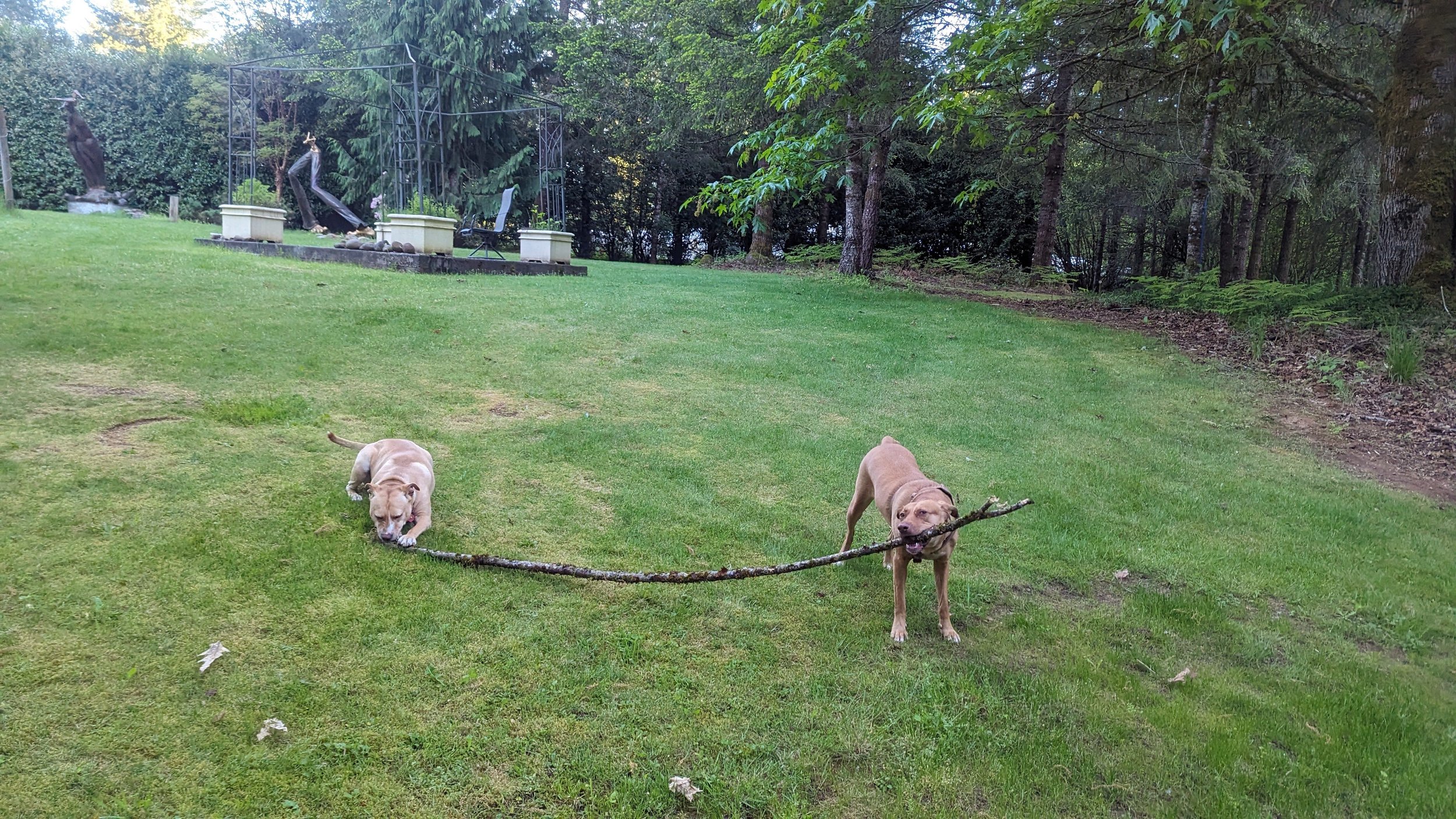Yesterday, my dog, Athena, got into some trouble.
Athena is very well-behaved. We walk everywhere off leash because I trust her to listen and stay close. She looks at me to ask permission before chasing rabbits in the yard. (Don’t worry, she never gets close.) I let her roam in the forest around my house because I know she comes running as soon as I whistle.
But yesterday, my partner’s friend, Gabriel, came over with his dog, Ruby. Ruby is one of Athena’s best friends. They are both wonderful, sweet dogs. But when they get together, they rile each other up and turn into chaos monsters.
It’s like the dog version of a reasonable, middle-aged person getting together with an old drinking buddy. They get wild, take too many tequila shots and end up flipping over tables in the bar.
When Ruby comes over, Gabriel and I both keep an eye on the dogs while they run around the property to make sure they stay out of trouble. But yesterday, I when I poked my head outside to check on them, I heard a riot of shrieking barks in the distance. I put on my shoes and ran.
Gabriel had beat me there and was crouching near a very upset cat. He shooed the dogs away from squaring off with the cat, but they were still riled up and circling.
I separated the dogs and checked them for injuries, then called my vet friend who offered recommendations to care for the cat. In the end, everyone was okay and the cat went home to the neighbor’s house.
After she calmed down, Athena was very ashamed and concerned. As soon as she was inside, separated from her chaos buddy, she returned to her normal, conscientious self, and I could tell she felt bad about her behavior.
This got me thinking: How often do we humans do the same thing in our quest for self-improvement?
People on a journey of growth and transformation can self-sabotage or backslide into old behavior patterns, and then fall into a shame spiral.
Like Athena, we can fall prey to:
Peer influence and environmental triggers: Just like Athena's behavior changed when Ruby was around, people can revert to old habits or behaviors when in the presence of certain people or environments associated with their past selves.
Temporary loss of self-control: Athena's usual self-control disappeared in the excitement of playing with Ruby. Similarly, people may lose sight of their goals or values in moments of high emotion, stress, or excitement, leading to impulsive decisions that contradict their growth efforts.
The "all or nothing" mindset: When people slip up in their journey of self-improvement, they might feel like they've completely failed, like how Athena felt ashamed after the incident. This can lead to a "why bother?" attitude. They may abandon their efforts instead of viewing the setback as a temporary and natural part of the growth process.
Comfort in familiar patterns: Even when people are committed to change, old behavior patterns can feel comfortable and familiar. In stressful or uncertain times, they might revert to these patterns as a coping mechanism, like how Athena reverted to more instinctual, less controlled behavior when excited.
Lack of consistent accountability: Just as Athena and Ruby needed consistent supervision to stay out of trouble, people often struggle to maintain new habits or behaviors without consistent accountability or support systems in place.
Underestimating the power of triggers: People might overestimate their ability to resist old temptations or triggers. This can lead to putting oneself in challenging situations before being prepared to handle them.
The shame spiral: After a setback, people often feel intense shame or guilt, which can lead to further self-destructive behavior as a way of punishing themselves or escaping these negative feelings.
Difficulty in maintaining long-term focus: Just as Athena forgot her training in the excitement of the moment, people can lose sight of their long-term goals when faced with short-term pleasures or distractions.
Fear of success or change: Sometimes, people subconsciously sabotage their own progress because they fear the unknown or the responsibilities that come with success and personal growth.
Lack of self-compassion: People often judge themselves for setbacks, forgetting that growth is not a linear process. Learning to be kind to oneself is crucial for long-term success.
Sound familiar? If so, you're not weak, and you're not alone. These are common hurdles on the path to lasting change.
This is where I come in. As a Shaman and Spiritual Mentor, I specialize in helping people like you navigate the challenges of transformation.
I offer 1:1 support for healing and growth, as well as training in Shamanism and Alchemy. Ready to take the leap?
If you're tired of taking one step forward and two steps back on your journey, it's time for a change. Don’t let another day go by where you feel stuck.
>>>If you’re ready to stop self-sabotaging, click here.
Remember, growth isn't always linear. But with the right guidance, you can make consistent progress towards becoming the person you want to be.
Many blessings,


